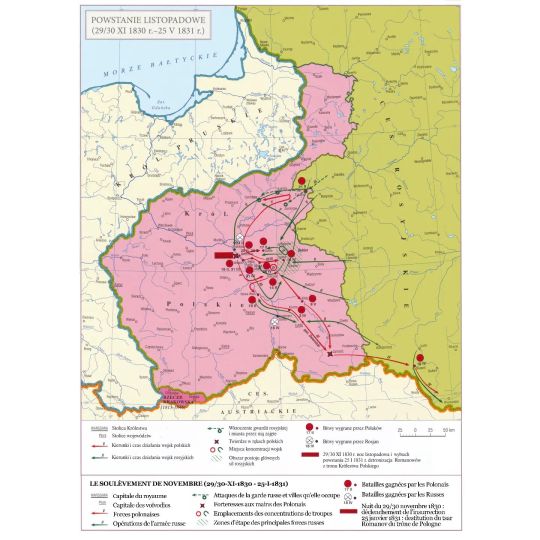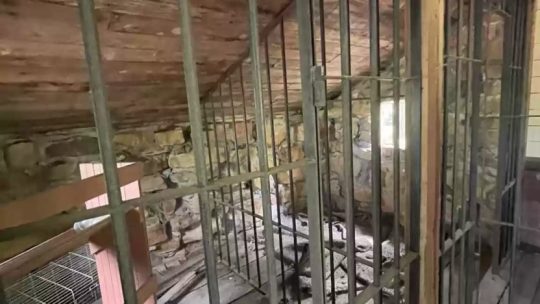#warsaw jail
Text
Spectrewaves Paranormal Laynee and Don were at Old Warsaw Jail on a Paranormal Investigation.
While taking photos in an old library at the jail the photo to the left appears to have two faces and only 1 person was present
The left is normal then the right looks like a zombie coming from above spectrewaves the left eye if your looking at the photos seems to have blood from a shot gun seems half of the face is gone.
We also notice the vest spectrewaves is wearing is pink the apparition looks like she has a white halter top
This photo was taken on a S10 plus phone camera
(we were told bybers at warsaw jail before this picture was taken a women was shot in the eye at the spot in the library decades ago where this eerie Paranormal picture was captured)
Spectrewaves Paranormal
Spectrewavesllp Paranormal
#spectrewaves #spectrewavesllp #Warsaw #warsawjail #hauntedjail #ghostphoto #spiritpic #spirits #ghostpic #spiritpic #ghostphotography #laynee #Don #Paranormalinvestigation #Paranormalinvestigator #warsawindiana #haunting #Paranormalstory #ghostimage #Paranormalresearch #double #cameras #unexplained #Paranormalactivity #ghostly #residualhaunting #haunts

#spectrewavesllp#paranormal investigation#paranormal investigators#spectrewavesllp paranormal#ghost hunt#paranormal evidence#ghost hunters#most haunted#vortex#hauntings#laynee#don#spectrewaves#ghost hunting equipment#ghost busters#ghost hunter#ghost#warsaw jail#warsaw indiana#haunted indiana#haunted location#haunted jail#layneeloy#Foo foo fecor#best paranormal evidence#paranormal activity#paranormal news#paranormal investigations#mel meter
2 notes
·
View notes
Text

Rabbi Reuven Israel Kott was a Torah prodigy whose cleverness and chutzpah saved thousands of Jews from annihilation by the Nazis.
Born in a Polish shtetl in 1897, Reuven was one of fifteen children. His family were Hasidic followers of the Ger Rebbe.
Reuven’s exceptional intellect was apparent at a young age. He was a gifted scholar of Talmud and Jewish scripture, so precocious that he was given rabbinic ordination when only 17 years old.
The Rebbe took a special liking to Reuven, and every Friday night Reuven sat next to the great man at his festive Sabbath gathering. Small in size - he stood only 5’1” - Reuven was known for his big brain, and big heart.
Reuven was selected by his community to represent them as the Jewish voice on the local provincial council. When the Polish president died in the 1920’s, young Reuven stood at the graveside with other clergy and delivered a eulogy on behalf of the Jews of Poland.
Although life seemed fairly good for Polish Jews at the time, the Ger Rebbe sensed that big trouble was coming. He urged his followers to get out of Poland and move to Eretz Yisrael (the Land of Israel), at that time British Mandate Palestine.
As the Rebbe’s right-hand man, Rabbi Reuven Kott threw himself into the mission of helping Jews leave Poland and return to their ancestral homeland.
The British had a quota system restricting the number of Jewish families they let in. Reuven took advantage of a bureaucratic loophole defining “family” as two parents and an undetermined number of offspring.
Reuven collected money and bribed Polish authorities to get blank birth certificates. He would then “create” new families, matching people up, changing names and identities as needed. Every “family" had at least a dozen children.
Reuven told those he helped that they must stick with their fake identity. Most people complied, but a few didn’t and were caught. Under threat of being sent back to Poland, somebody gave Reuven’s name to the authorities.
Reuven and his brother were on a train in Warsaw when three plain-clothes officers approached. After verifying his identity, they arrested Reuven for bribery and forgery and threw him in jail. As a pious Jew, Reuven couldn’t eat the non-kosher jail food, so every day his daughter brought him a kosher meal - a two hour journey each way.
After several long months, his brother finally got word that there was going to be a hearing in the case. He went to visit Reuven in jail, told him the news and asked which lawyer he wanted to hire.
Reuven scribbled something on a scrap of paper, folded it up and slipped it through the bars of his cell. Outside the jail, Reuven’s brother unfolded the note. He was shocked to read the contents: “Hire me the most anti-Semitic lawyer in Warsaw!“
Reuven’s family was baffled. With so many top-notch Jewish lawyers, why would he want an anti-Semite? Had his incarceration led to a mental breakdown? Reuven’s brother assured them that he was of sound mind, and he went to Warsaw and found an attorney notorious for his fierce hatred of Jews.
The day of the hearing arrived, and the courthouse was packed with hundreds of Hasids from Reuven’s community. Reuven was allowed only three minutes with his lawyer, and then the hearing began.
To everybody’s shock, Reuven’s lawyer stood up, made a brilliant argument, and got the case dismissed.
Back home in the shtetl, everybody wanted to know what Reuven had said to his lawyer in those three minutes. Reuven said his Talmud study had taught him that in a business deal, if you get three “Yes” answers, the deal will close.
He asked his lawyer three questions:
- You hate us Jews, don’t you?
- Do you want to see me rot and die in jail?
- Would you like all of us Jews gone from Poland?
The lawyer answered yes to all three questions. Reuven immediately shot back, “What good would it do if one measly Jew rots in jail? If you set me free, I can get all the Jews out of Poland!”
Reuven got what he wanted by blinding the lawyer with his own hate. He continued his work “creating” large families and helping them move to Palestine. The anti-Semitic attorney even helped him procure more blank birth certificates. People often asked Reuven when he would go to Eretz Yisrael. He said, “I’m like the captain of a sinking ship. It is my responsibility to get all the passengers out before I get in the lifeboat.”
Over the course of 20 years, Reuven helped tens of thousands of Jews escape Poland. Today, almost half a million descendants of those Polish Jews owe their lives to Rabbi Reuven Israel Kott.
Unfortunately, Reuven himself never made it to Israel. He was murdered at Auschwitz in 1942.
For proving that one small man in three short minutes can accomplish miracles beyond measure, we honor Rabbi Reuven Israel Kott as this week’s Thursday Hero at Accidental Talmudist.
This story was told to us by Reuven’s granddaughter, Ziporah Bank. She heard it from her mom - the daughter who brought kosher meals to Rabbi Kott in prison.
Accidental Talmudist
127 notes
·
View notes
Photo

The Polish revolts of the 19th century
🇵🇱 "Wielki atlas historyczny", éd. Demart, Varsovie, 2023
by cartesdhistoire
In 1815, the Congress of Vienna gave Russia the majority of Polish territories called the "Kingdom of the Congress". Krakow, which benefits from the Austro-Russian rivalry, is independent.
In 1830, when the Tsar decides to send Polish troops to fight the revolutionary troubles in France and Belgium, an uprising broke out in Warsaw, and then wins the entire kingdom. The "November uprising" quickly turns into open war, which the insurgents finally lose, who lack foreign support and that of small peasantry.
Then, Patriotic Actions (June 11 & Nov 29) 1860) murderous repressions (February 27th. and April 8, 1861). In October 1862, the head of the civil government announces an uprising of recruits, which primarily affects patriotic activists. This raft marks the beginning of an uprising, generalized but disorganized; evolving into a guerrilla, it is crushed by the Russian army (January). 1863 - June 1864).
The kingdom already lost in 1841, its currency, the złoty, to the benefit of the ruble, then, in 1847, the Napoleon code to the benefit of Russian law and, in 1849, its system of weight and measurements ceased to exist. It is directly incorporated into the Russian empire as the "Vistula Country", a purely geographical name that emphasizes the will to deny its Polish character. Many insurgents are deported to Siberia and their lands confiscated. Russian becomes the official language, all universities are russified, Orthodox Christianity is promoted state religion. The Catholic Church sees its property confiscated, its monasteries closed, its bishops jailed or deported (there hasn't been a single in 1872) and a huge Orthodox Cathedral is built in the heart of Warsaw. A drastic police regime makes any form of cultural activism or armed uprising impossible.
In the Prussia Grand Duchy of Poznan, an uprising took place in the spring of 1848. After his failure, the autonomy, already limited, of the Grand Duchy is abolished.
53 notes
·
View notes
Text
Young Queer People Are Being Put on Trial For Fighting Hate
Poland has been ranked as the worst country in the European Union for gay rights, and is notorious for introducing “LGBT-free zones” – areas that have declared themselves hostile to “LGBT ideology”, and where pride marches and other events are banned. Same-sex couples are unable to marry or adopt, and a number of other activists have been arrested.
In an interview with VICE World News in central Warsaw, Margot said they had no hope of a fair trial in a country where judicial independence has been severely eroded by the ruling Law and Justice (PiS) party.
A final hearing scheduled for last month was at the last moment postponed until the summer, dragging out the case for almost three years.
“It’s never a fair trial here, in this political climate,” they said.
“Even if I am found not guilty, I will have lost so much, so much health and time for this. Nothing will compensate for my time in jails, my arrests and so on. The damage is already done.” They suffer with their mental health and have ongoing problems with their immune system.
172 notes
·
View notes
Text
Two top PiS politicians, one of them the former interior minister, are jailed, in what could become a major battleground for the former ruling party as it attempts to force early elections.
On Wednesday morning, the former Polish interior minister Mariusz Kaminski and his ex-deputy, Maciej Wasik, woke up in prison in eastern Warsaw after the police had spent the better part of the previous day trying to arrest the duo to serve sentences for crimes they have already been found guilty of, but for which the opposition claim they should not be imprisoned.
On Tuesday, the police tried to implement a court order to arrest the two Law and Justice (PiS) politicians, who were sentenced in December 2023 to two years in prison for abuse of power committed in 2007 while running the Central Anti-Corruption Bureau (CBA), but the move turned into something out of a political thriller.
With PiS politicians protesting the arrest warrants, and Kaminski and Wasik themselves arguing they are “political prisoners”, the PiS-allied President Andrzej Duda invited the two to a ceremony at the Presidential Palace, taking photos with them as police officers were busy searching their homes in another part of the Polish capital.
Kaminski and Wasik ended up spending the whole day at the Presidential Palace. And it was only in the evening, at around 19:30, that the police decided to enter the palace and arrest the two.
Duda and his supporters point to the fact that the two politicians were pardoned by the president shortly after the populist-conservative PiS came to power in 2015. However, the Supreme Court, the new government that won the October election and legal experts argue that the president’s act has no legal consequences, as the original 2015 court ruling had not yet been made final (only the December 2023 ruling was final).
This is one of several flashpoints many had foreseen when the alliance of three opposition parties won Poland’s October 15 general election and promised to reverse many of what opponents regard as PiS’s anti-democratic policies.
The stakes for the PiS camp and Poland could not be higher. On the one hand, with the new government setting up three separate parliamentary commissions to investigate potential abuses by the previous PiS government – including the use of the Pegasus surveillance software to spy on political opponents – many of its politicians fear going to jail themselves eventually. More immediately, observers are warning that PiS could try to use the arrests of Kaminski and Wasik to force an early election just months after it lost the previous one.
‘Political prisoners’
Kaminski and Wasik were elected to parliament on the PiS list in the October general election, but in December the two politicians were convicted for orchestrating a scheme, including the use of intelligence agents and falsifying of documents, designed to bring down a political opponent. The two argued they were “fighting corruption”; the judge ruled the means used were illegal. The sentence is final.
Szymon Holownia, the marshal of the Sejm, declared their mandates were invalidated by the court ruling and terminated their voting privileges. However, PiS insists the two should remain in parliament and can vote.
A chamber of the Supreme Court ruled on Wednesday that Kaminski was indeed no longer an MP after Kaminski had appealed Holownia’s decision.
Kaminski and Wasik themselves had announced their intention to vote during a new parliamentary session that was set to begin on Wednesday, but which Holownia has since postponed to next week.
Crucially, parliament has to vote on a new budget in this coming session, and the new government has only until the end of January to bring the budget to President Duda for approval. Duda, who cannot veto the budget, can nevertheless send it to the Constitutional Tribunal in the event he has legal doubts and thus delay its adoption. Experts say Duda could invoke the exclusion of the two PiS politicians from voting as a reason to send the budget to the Constitutional Tribunal, which the EU regards as an illegitimate and politicised body after PiS appointed its allies to it.
In such a scenario, Duda could eventually claim the deadline for adopting the budget has been breached and call for an early parliamentary election.
While both sides of the political camp await the next developments, PiS has been mobilising to push a narrative in which it is depicting the attempts by the new government to “clean up” after PiS as totalitarian acts, with the former ruling party now a persecuted minority.
There was a similar flashpoint when the new government in December changed the leadership of public media channels, which during PiS’s eight years in power had become government mouthpieces. PiS and its friendly journalists organised occupations of some of these media institutions, while hundreds of supporters protested outside.
On Tuesday night, PiS politicians, including leader Jaroslaw Kaczynski, showed up at the police station and called on their supporters to join them. Hundreds also protested in front of the Presidential Palace. Later that evening, Kaczynski went to the detention centre where Kaminski and Wasik are being held. On Wednesday morning, some Polish media reported Kaminski had gone on hunger strike.
“It is an unprecedented scandal that Mariusz Kaminski and Maciej Wasik are in prison,” Kaczynski told supporters. “They are the first political prisoners in Poland since 1989. Those who are responsible for this will suffer the consequences.”
Jacek Sasin, a former PiS minister, called the arrests a “coup d’etat”, while PiS euro-parliamentarian Zdislaw Krasnodebski described Tuesday night’s events as a “police attack on the Presidential Palace.”
Key politicians in PiS are now calling on supporters to protest in Warsaw on Thursday afternoon, and local structures of the party have been engaged for days in organizing transport from across the country for those willing to attend.
According to a press statement issued on Wednesday morning, PiS representatives say they expect tens of thousands to attend.
20 notes
·
View notes
Text
Mariusz Kaminski and Maciej Wasik were sentenced to two years' jail last month for abuse of power when they led an anti-corruption office in 2007.[...]
The men, who were elected PiS MPs in October, refused to recognise last month's court decision because President Andrzej Duda, a PiS ally, pardoned them for the crime in 2015. Mr Duda has also said he does not recognise the court's ruling because he insists his pardon remains valid.
The pair have been stripped of their parliamentary mandates, but both they and President Duda insist they remain legally elected MPs because of the pardon.
On Monday evening, the court issued a warrant to police to detain the men. Despite this, Mr Duda invited both to Warsaw's Presidential Palace on Tuesday morning to attend a ceremony to swear in two of their former colleagues as presidential advisers.
Several hours later, they emerged from the palace to speak briefly to reporters, all the while remaining inside its grounds. Mr Kaminski said they will be "political prisoners" if they are arrested and thanked Mr Duda for his support.
"We are dealing with a very serious state crisis. A grim dictatorship is being created," Mr Kaminski said. They then returned inside the palace as the political theatre unfolded.
Moments later, Prime Minister Donald Tusk told a news conference the situation was "unbelievable". He said the court's ruling must be respected and suggested President Duda was helping the men evade justice.[...]
Following the arrests, several hundred PiS supporters demonstrated outside the palace in support of the men.[...]
Mr Tusk's coalition took office last month pledging to undo PiS's changes to the judiciary, public media, and civil service that the European Commission and many other international bodies say have undermined the rule of law in Poland.
One of its first acts was to reform the state TV, radio and news agency that PiS had transformed into a propaganda mouthpiece for its government.
But its methods were similar to PiS's, first using a government minister to sack media boards and install new people ahead of planned legislative reform.[...]
Former PiS prime minister Mateusz Morawiecki told the BBC Mr Tusk's government talked loudly about democratic standards but fell well short in practice.
"We are witnessing an unprecedented attack on the rule of law. Tusk's government decided it could take over public television and media by force. This has nothing to do with democratic standards. We have not seen such brutal government action since communism. It is all the more outrageous that this is done by people who have such slogans of democracy on their lips," Mr Morawiecki said.
Given PiS's record of controlling state institutions while in office, many Tusk supporters argue such accusations are the height of hypocrisy.
Welcome to Modern Polish Politics, where Liberals accuse other Liberals of being Communists [9 Jan 24]
19 notes
·
View notes
Text
I really wanna know why both Jewish and gentile "allies" in the West are unable to step over a bar that is already in hell.
Context:
- Eighteen year old Israeli decides to do the normal person thing, chooses to go to jail than join the IOF. The sentence will be renewed every 30 days if he doesn't join. Usually this goes on for over a year until they get sick of them. Kid also writes a sweet, idealistic letter about Choosing Peace™ and that what they're doing to Palestinians is wrong. It's of course a very liberal Zionist speech that Condemns Hamas™ (sigh) and is very ignorant of the scope of Israeli occupation. But he comes from a Zionist family. This could be a start. It also undermines the whinging about the IOF being full of "kids who don't have a choice" other than dropping bombs on toddlers and shooting unarmed civilians in the head. Bar is in hell, but good for him. Let us move on.
- Or not. Within five minutes everyone and their dog immediately starts falling over themselves calling him a hero.
- Palestinians, Arabs and Muslims: Wtf? Our people are literally being killed for doing ANYTHING to protest our own slaughter? One guy willing to not take part OUR GENOCIDE is a hero?? He and his family are settlers and still part of the ongoing violence against us?
- Jewish "allies": omg just say you hate Jews! IT'S NOT EASY TO SIT IN JAIL ALRIGHT?
- Palestinians: As opposed to blowing our children to pieces??
- Jewish "allies": See, this is why you people can't get free! I bet you're feds!
- Western gentile "allies": I know bb they're so mean and unreasonable! Like are we supposed to blame our kids for having joined in our militaries too?? Antisemitism!
But I get their point. I'm sure Jews in the camps loved seeing gentiles hail Germans heroes for not joining the Third Reich, while calling the Warsaw Uprising terrorists. Not even after, mind. DURING. Children of slavers should have statues built in their honour just not joining the Confederate Army! (Actually they probably do say that, what do I know.)
I'm not Muslim or Palestinian btw. I'm speaking on my own behalf as someone who has also been terrorized by Zionists on this site way before I even knew what they were, enabled by both ordinary Jews and gentiles who didn't think Zionists were a real threat and more interested in policing BIPOC for calling them out. Meanwhile, Palestinians bend over backwards to never single Jews out and keep them safe. But I compiled that list on my pinned and I know exactly how many anti Zionist Jewish organisations and allies there are in the movement, and how many are either defunct, grifting or Two-State normalizers that speak over Palestinians, or just plain apologists like the one I now have to take off my list. Palestinians are still being let down by each one of you one after the other like dominoes. You cannot keep claiming credit for allyship this way. If you truly want to divest from Israel, you need to do better.
ALL you non-Muslim and western people in your nice unbombed homes with all your limbs and families intact appear to believe that the countries your people blow up with your votes and tax dollars should be grateful to you for speaking up for them. Stop policing the anger of victims. Know when to shut up. Or just stay home. All of Palestine's gains so far have been the work of Palestinians themselves, and of the armed resistance from the other Arab countries most victimized by yours. Israelis will never be key to Palestine's liberation, and their allyship have always been too expensive to be worth it. The master's house will never be dismantled by the master's own tools, much less the members of the master's own household.
#free palestine#white allies#jewish allies#western allies#western leftists#antisemitism#anti zionism#white supremacy#racism#islamophobia#tone policing#fuck israel#conscientious objector#pro palestine protest#iof terrorism#anti arab racism#decolonization#liberation#muslim lives matter#knee of huss#allyship
16 notes
·
View notes
Text
Polish police have arrested the former interior minister and deputy interior minister inside the presidential palace in Warsaw in a day of unprecedented political theatre.
Mariusz Kaminski and Maciej Wasik were sentenced to two years' jail last month for abuse of power when they led an anti-corruption office in 2007.
Following the arrests, the new interior minister Marcin Kierwinski wrote on X: "Everyone is equal before the law."
The arrests highlight the political turmoil between the Law and Justice (PiS) party and the new pro-EU coalition.
The men, who were elected PiS MPs in October, refused to recognise last month's court decision because President Andrzej Duda, a PiS ally, pardoned them for the crime in 2015. Mr Duda has also said he does not recognise the court's ruling because he insists his pardon remains valid.
The Polish president said in a televised address on Wednesday that he was deeply shaken by the two men being jailed, and described them as honest.
The two MPs have been stripped of their parliamentary mandates, but both they and President Duda insist they remain legally elected MPs because of the pardon.
On Monday evening, the court issued a warrant to police to detain the men. Despite this, Mr Duda invited both to Warsaw's Presidential Palace on Tuesday morning to attend a ceremony to swear in two of their former colleagues as presidential advisers.
Several hours later, they emerged from the palace to speak briefly to reporters, all the while remaining inside its grounds. Mr Kaminski said they will be "political prisoners" if they are arrested and thanked Mr Duda for his support.
"We are dealing with a very serious state crisis. A grim dictatorship is being created," Mr Kaminski said. They then returned inside the palace as the political theatre unfolded.
Moments later, Prime Minister Donald Tusk told a news conference the situation was "unbelievable". He said the court's ruling must be respected and suggested President Duda was helping the men evade justice.
"There is no rulebook for the prime minister or interior minister on how to act when convicts are in the Presidential Palace. This is clearly taking advantage of a situation in which no one will use force against such an institution as the president," he added.
Following the arrests, several hundred PiS supporters demonstrated outside the palace in support of the men.
On Wednesday morning, Mariusz Kaminski announced he was going on hunger strike, "as a political prisoner, from the first day of my imprisonment". Hunger strikes are not an uncommon form of protest in Poland, and they do not necessarily mean a refusal to accept all food and liquids.
The deputy justice minister stressed that neither of the men was a political prisoner but any prisoner had the right to refuse food or drink if they wished.
Last year, the Polish Supreme Court ruled Mr Duda's 2015 pardon was invalid because it was issued while the men were appealing against their conviction, ie before the original conviction was final. Mr Duda disputes that and insists the pardon is still binding.
To complicate matters, the Constitutional Tribunal and a new Supreme Court chamber, both of which are staffed by judges nominated by PiS, have ruled in favour of Mr Duda.
Mr Tusk said Mr Duda could resolve the stand-off by pardoning the men again, now that the ruling is final. But that would call into question the legal status of the initial pardon.
Mr Tusk's coalition took office last month pledging to undo PiS's changes to the judiciary, public media, and civil service that the European Commission and many other international bodies say have undermined the rule of law in Poland.
One of its first acts was to reform the state TV, radio and news agency that PiS had transformed into a propaganda mouthpiece for its government.
But its methods were similar to PiS's, first using a government minister to sack media boards and install new people ahead of planned legislative reform.
The Helsinki Foundation for Human Rights acknowledged PiS had made it legally difficult to reform the public media, which it said required "urgent reform" because it had become "a propaganda mouthpiece" under PiS, but said the new government's changes "raise serious doubts".
Former PiS prime minister Mateusz Morawiecki told the BBC Mr Tusk's government talked loudly about democratic standards but fell well short in practice.
"We are witnessing an unprecedented attack on the rule of law. Tusk's government decided it could take over public television and media by force. This has nothing to do with democratic standards. We have not seen such brutal government action since communism. It is all the more outrageous that this is done by people who have such slogans of democracy on their lips," Mr Morawiecki said.
Given PiS's record of controlling state institutions while in office, many Tusk supporters argue such accusations are the height of hypocrisy.
5 notes
·
View notes
Photo


This is a once-in-a-lifetime deal. It’s a Pioneer style settlement situated on 20 beautiful acres that was formally a 1800's themed park in Warsaw, Missouri and it’s for sale for only $295K.

It was all created by one family starting in the 1970s. The son would draw out buildings, then they would create them. The end result is a miniature 1800s-era town.

The pioneer village was a local novelty that was open to the public from the late 1970s until 1997.


They built a jail, a schoolhouse, a general store, woodworking shop, cabinetmaker, a blacksmith shop, and a mill with a steam engine that makes corn meal


A lot of locals have such wonderful memories. The school would bring classes out there and they would serve ham and beans and cornbread made from the corn meal from the mill.

Here’s the General Store.


Look at the one-room schoolhouse. Isn’t it cute?

A cabinet maker shop. Some of the structures will need some work.


Look at the mill where they made the cornmeal.



Cute cabin. Unfortunately, the antiques and vehicles don’t come with the place, b/c they’re family heirlooms.


The tiny town takes up about 2 of the property’s 20 acres, so the remaining acreage is open to the whims of a creative buyer.


“You couldn’t go out and build all this. You can redo what is there and make sure it is secure, but there’s nothing like owning an 1830s cabin. You see how these people lived. It’s a Laura Ingalls thing. It’s sweet,” says the realtor.


The reason that the owner is keeping all the antiques is b/c he plans to build another one where he moves next.

There’s also a small 1 bdrm. house on the property. It’s a great price, but a new owner would have to start from scratch.
https://www.realtor.com/realestateandhomes-detail/24025-Cumberland-Gap-Ave_Warsaw_MO_65355_M77351-27948
97 notes
·
View notes
Text

Zdzisław Beksiński (1929-2005, Polish)
Untitled computer photomontage (between 2000 and 2005)
/copyrights inherited by Muzeum Historyczne w Sanoku
📌 and I admire the talent of this artist and it was so sad to read this article… about his life, especially his later years and death. - Lan~*
Zdzisław Beksiński – Poland's Dark Dystopian Surrealist
writer By Thembeka Heidi Sincuba
▪︎ Later Years and the Artist's Death
Zofia, Beksiński's wife, died in 1998, and Tomasz, his son (a prominent radio host, music writer, and film interpreter) died from a drug overdose a year later, on Christmas Eve 1999. Beksiński found his son's body. Unable to accept the death of his son, he attached an envelope to his wall labeled “For Tomek in case I die.”
Beksiński was discovered dead in his Warsaw residence on the 21st of February, 2005, with multiple knife wounds, two of which were fatal. Shortly after the incident, Robert Kupiec, the son of his lifelong caregiver, and one of his friends were arrested. The court of Warsaw condemned Robert Kupiec to 25 years in jail on the 9th of November, 2006. Beksiński had declined to lend Robert Kupiec about 100 US dollars before his death.
Although Beksiński's art was typically dark, he was considered to be a cheerful person who enjoyed chatting and had a sharp sense of humor. He was humble and bashful, avoiding public occasions like the inauguration of his own shows. Music, he said, was his major source of motivation. He claimed to be uninfluenced by books, movies, or the work of other painters, and he rarely went to museums or galleries. Beksiński rejected precise examination of his work's subject, stating, “I cannot think of a logical remark about painting.”
▪︎ Zdzisław Beksiński's Personality
He was particularly scornful of people who sought or gave easy explanations for what his works “meant.”
A museum devoted to Beksiński may be found in the Polish town of Sanok. A Beksiński museum at the City Art Gallery in Czestochowa, Poland, opened in 2006, housing 50 canvases and 120 sketches from the Dmochowski estate (who possesses the largest personal collection of Beksiński's work). The formal opening of The New Gallery of Zdzisław Beksiński in the renovated portion of the chateau occurred on the 8th of May.
▪︎ Beksiński's Artistic Legacy
▪︎ Beksiński's Short Stories
Beksiński authored short tales between 1963 and 1965. However, he was dissatisfied with the outcomes and hid them, preferring to refine his painting abilities instead. They were kept a secret for over 50 years by everyone save the writer's closest family and friends. A compilation of Beksiński's short stories was released in 2015, 10 years after his death.
Notwithstanding their incomplete and disorganized origins, Beksiński's works of literature are regarded as a fascinating voyage into his past, evocative of his subsequent dreamy works of art; they range from conceptual narratives and metaphysical self-reflections to figurative post-apocalyptic fantasy and crime drama storylines.
Beksiński's writing phase has been characterized as “short and intense,” because he wrote 40 short tales in less than two years, dabbling with format and plot.
4 notes
·
View notes
Text
Biden Handcuffed on Britney Griner
LOS ANGELES (OnlineColumnist.com), July 6, 2022.--Hammered by the African American and Gay communities, 79-year-old President Joe Biden finds himself in the hot sea over 31-year-old, 6 foot-nine WNBA start Britney Grinerm, holed up in a Russian jail over cannabis possession on Feb. 17. Griner wrote a handwritten not July 4 to Biden telling him not to forget about her or 52-year-old former Marine Paul Whelan, whose serving out 16-year prison sentence for spying in the Russian Federation. Griner’s case receives much more attention because she’s Black and Gay, two protected groups in today’s U.S., where a variety of lobbying groups can put enormous pressure on the White House. Britney’s spouse, Cherelle, believe the White House or the State Department haven’t done enough to get Britney set free. “I will not be quiet anymore,” Cherelle said,. “They’re not moving, they’re not doing anything,” referring to the Biden White House.
Cherelle wants more action on her wife because she heard in her communications a distress call. “So my wife is struggling, and we have to help her,” Chrerlle said. But what Cherelle and other special interest groups protecting Black and Gay rights not get is that the Biden White House has horrific relations with the Russian Federation. Under the best of circumstances, it would be difficult to cut a deal to get Britney out. But under current circumstances, U.S.-Russian relations are at a post-WW II low, all because Biden chose to name-call, saying 69-year-old Russian President Vladimir Putin a “soulless killer,” March 18, 2021, early on in his presidency. When the war started Feb. 24, no one imagined that the White House would join the fight against Putin and the Russian Federation, making hostage negotiations all but impossible. Biden has burnt all his bridges with the Russian Federation, something Cherelle doesn’t understand.
Normally, in past administrations dating back to President Harry Trump, the U.S. has had workable, pragmatic relations with the former Soviet Union or its successor the Russian Federation. Former President Donald Trump had excellent relations with the Kremlin, despite constant accusations about coddling dictators or colluding with the Kremlin. Democrats and the U.S. media made it impossible for Trump to develop solid relations with the Kremlin, but somehow, because of his social skills, still managed to keep close relations. Democrats and the U.S. press did everything possible to sabotage Trump’s relations with Putin. So, now that Biden wrecked U.S.-Russia relations, all the press says is that Putin is a “butcher and war criminal,” making relations with the Kremlin near impossible. So, when it comes to getting Griner out, Biden and press have made it next to impossible.
Negotiations to get out former Marine Trevor Reed were successful back in April, right after Biden announced March 26 in Warsaw, Poland, that Putin should not remain in power. “We won’t stop until Paul Wheland and others join Trevor in the loving arms of family and friends,” Biden said in a statements. Cherelle didn’t like that Biden didn’t name Britney in his message. “This isn’t just about Britney,” said Kemberly St. Julian-Varnon, University of Pennslyvania scholar specialized in Black identify in the Soviet Union. “Paul Whelan has been held in Russian form more than four years. He’s a straight white man. We have to think both of their case in the context of international foreign policy,” St. Julian-Varnon said. St. Julian-Varnon is too close to her subject to recognize that U.S.-Russian relations are at an all time low, especially because Biden chose to start a proxy war against the Russian Federation.
Whatever Britney Griner’s race or sexual orientation, it has nothing to do with why the State Department has its hands tied in terms of high-end Russian diplomacy. Never before in history, has the U.S. been in a proxy war, with Ukrainian troops, to topple the Russian Federation. Whether Briney’s race or sexual identity helps or not, getting release from Russian custody, the biggest stumbling block is the U.S. proxy war in Ukraine against the Russian Federation. If Biden really cared about getting Britney released, he’ll have to make some big concessions on Ukraine, something he’s not prepared to do. As long as Biden supplies the latest lethal weapons to Ukraine, Putin won’t be inclined to let Griner out of jail. Biden has nearly broken off all diplomatic relations with the Russian Federation, leaving high end diplomacy all but impossible until something’s done in Ukraine.
Whatever 59-year-old Secretary of State Antony Blinken does to get Griner out of a Russian jail, it’s all linked to better U.S.-Russian relations. Blinken, who goes to a G20 meeting this week in Bali, Indonesia, is refusing to meet with 72-year-old Russian Foreign Minister Sergey Lavrov. State Department Spokesman Ned Price has already said Blinken has no plans of meeting with Lavrov, because of the Ukraine War. As long as Blinken take an holier-than-thou attitude, it’s doubtful they’ll have much success with Griner’s case. Blinken should do everything possible to mend fences with Lavrov, even if it involves sucking it up on Ukraine. You can’t expect any progress on Griner unless the two sides are talking again. Blinken has a perfect chance this weekend to talk to Lavrov about Griner. As long a Biden and Blinken refuse to talk to Russia, things don’t look good for Griner.
About the Author
John M. Curtis writes politically neutral commentary analyzing spin in national and global news. He’s editor of OnlineColumnist.com and author of Dodging The Bullet and Operation Charisma.
2 notes
·
View notes
Text
Events 4.19 (before 1940)
AD 65 – The freedman Milichus betrays Piso's plot to kill the Emperor Nero and all of the conspirators are arrested.
531 – Battle of Callinicum: A Byzantine army under Belisarius is defeated by the Persians at Raqqa (northern Syria).
1506 – The Lisbon Massacre begins, in which accused Jews are slaughtered by Portuguese Catholics.
1529 – Beginning of the Protestant Reformation: After the Second Diet of Speyer bans Lutheranism, a group of rulers (German: Fürst) and independent cities protests the reinstatement of the Edict of Worms.
1539 – The Treaty of Frankfurt between Protestants and the Holy Roman Emperor is signed.
1608 – In Ireland, O'Doherty's Rebellion is launched by the Burning of Derry.
1677 – The French army captures the town of Cambrai held by Spanish troops.
1713 – With no living male heirs, Charles VI, Holy Roman Emperor, issues the Pragmatic Sanction of 1713 to ensure that Habsburg lands and the Austrian throne would be inheritable by a female; his daughter and successor, Maria Theresa, was not born until 1717.
1770 – Captain James Cook, still holding the rank of lieutenant, sights the eastern coast of what is now Australia.
1770 – Marie Antoinette marries Louis XVI of France in a proxy wedding.
1775 – American Revolutionary War: The war begins with an American victory in Concord during the battles of Lexington and Concord.
1782 – John Adams secures Dutch recognition of the United States as an independent government. The house which he had purchased in The Hague becomes the first American embassy.
1809 – An Austrian corps is defeated by the forces of the Duchy of Warsaw in the Battle of Raszyn, part of the struggles of the Fifth Coalition. On the same day the Austrian main army is defeated by a First French Empire Corps led by Louis-Nicolas Davout at the Battle of Teugen-Hausen in Bavaria, part of a four-day campaign that ended in a French victory.
1810 – Venezuela achieves home rule: Vicente Emparán, Governor of the Captaincy General is removed by the people of Caracas and a junta is installed.
1818 – French physicist Augustin Fresnel signs his preliminary "Note on the Theory of Diffraction" (deposited on the following day). The document ends with what we now call the Fresnel integrals.
1839 – The Treaty of London establishes Belgium as a kingdom and guarantees its neutrality.
1861 – American Civil War: Baltimore riot of 1861: A pro-Secession mob in Baltimore attacks United States Army troops marching through the city.
1903 – The Kishinev pogrom in Kishinev (Bessarabia) begins, forcing tens of thousands of Jews to later seek refuge in Palestine and the Western world.
1927 – Mae West is sentenced to ten days in jail for obscenity for her play Sex.
1936 – The Jaffa riots commence, initiating the 1936–1939 Arab revolt in Palestine.
0 notes
Quote
Rabbi Reuven Israel Kott was a Torah prodigy whose cleverness and chutzpah saved thousands of Jews from annihilation by the Nazis.
Born in a Polish shtetl in 1897, Reuven was one of fifteen children. His family were Hasidic followers of the Ger Rebbe.
Reuven’s exceptional intellect was apparent at a young age. He was a gifted scholar of Talmud and Jewish scripture, so precocious that he was given rabbinic ordination when only 17 years old.
The Rebbe took a special liking to Reuven, and every Friday night Reuven sat next to the great man at his festive Sabbath gathering. Small in size - he stood only 5’1” - Reuven was known for his big brain, and big heart.
Reuven was selected by his community to represent them as the Jewish voice on the local provincial council. When the Polish president died in the 1920’s, young Reuven stood at the graveside with other clergy and delivered a eulogy on behalf of the Jews of Poland.
Although life seemed fairly good for Polish Jews at the time, the Ger Rebbe sensed that big trouble was coming. He urged his followers to get out of Poland and move to Eretz Yisrael (the Land of Israel), at that time British Mandate Palestine.
As the Rebbe’s right-hand man, Rabbi Reuven Kott threw himself into the mission of helping Jews leave Poland and return to their ancestral homeland.
The British had a quota system restricting the number of Jewish families they let in. Reuven took advantage of a bureaucratic loophole defining “family” as two parents and an undetermined number of offspring.
Reuven collected money and bribed Polish authorities to get blank birth certificates. He would then “create” new families, matching people up, changing names and identities as needed. Every “family" had at least a dozen children.
Reuven told those he helped that they must stick with their fake identity. Most people complied, but a few didn’t and were caught. Under threat of being sent back to Poland, somebody gave Reuven’s name to the authorities.
Reuven and his brother were on a train in Warsaw when three plain-clothes officers approached. After verifying his identity, they arrested Reuven for bribery and forgery and threw him in jail. As a pious Jew, Reuven couldn’t eat the non-kosher jail food, so every day his daughter brought him a kosher meal - a two hour journey each way.
After several long months, his brother finally got word that there was going to be a hearing in the case. He went to visit Reuven in jail, told him the news and asked which lawyer he wanted to hire.
Reuven scribbled something on a scrap of paper, folded it up and slipped it through the bars of his cell. Outside the jail, Reuven’s brother unfolded the note. He was shocked to read the contents: “Hire me the most anti-Semitic lawyer in Warsaw!“
Reuven’s family was baffled. With so many top-notch Jewish lawyers, why would he want an anti-Semite? Had his incarceration led to a mental breakdown? Reuven’s brother assured them that he was of sound mind, and he went to Warsaw and found an attorney notorious for his fierce hatred of Jews.
The day of the hearing arrived, and the courthouse was packed with hundreds of Hasids from Reuven’s community. Reuven was allowed only three minutes with his lawyer, and then the hearing began.
To everybody’s shock, Reuven’s lawyer stood up, made a brilliant argument, and got the case dismissed.
Back home in the shtetl, everybody wanted to know what Reuven had said to his lawyer in those three minutes. Reuven said his Talmud study had taught him that in a business deal, if you get three “Yes” answers, the deal will close.
He asked his lawyer three questions:
- You hate us Jews, don’t you?
- Do you want to see me rot and die in jail?
- Would you like all of us Jews gone from Poland?
The lawyer answered yes to all three questions. Reuven immediately shot back, “What good would it do if one measly Jew rots in jail? If you set me free, I can get all the Jews out of Poland!”
Reuven got what he wanted by blinding the lawyer with his own hate. He continued his work “creating” large families and helping them move to Palestine. The anti-Semitic attorney even helped him procure more blank birth certificates. People often asked Reuven when he would go to Eretz Yisrael. He said, “I’m like the captain of a sinking ship. It is my responsibility to get all the passengers out before I get in the lifeboat.”
Over the course of 20 years, Reuven helped tens of thousands of Jews escape Poland. Today, almost half a million descendants of those Polish Jews owe their lives to Rabbi Reuven Israel Kott.
Unfortunately, Reuven himself never made it to Israel. He was murdered at Auschwitz in 1942.
For proving that one small man in three short minutes can accomplish miracles beyond measure, we honor Rabbi Reuven Israel Kott as this week’s Thursday Hero at Accidental Talmudist.
This story was told to us by Reuven’s granddaughter, Ziporah Bank. She heard it from her mom - the daughter who brought kosher meals to Rabbi Kott in prison.
Accidental Talmudist

23 notes
·
View notes
Text










Bibi, Obama & Rutte to ICC jail in Hague for war crimes and murders of children and later to Rome to Colosseum for CRUCIFIXIONS.
Tusk, Sikorski & Komorowski to Warsaw jail for 25 years for treason.
Royals this offer is valid til end of summer 2024 so you can recieve HEAVENLY technologies!
Turn your souls to ADONAI EL turn away from fallen angels as they want you to fail big time!
Russian nuclear arsenal will be dezactivated as I will gain power over the Earth under your wings Royals and then we can hit Moscow & Petersburg badly and gain Russian territories.
0 notes
Text
History
January 17, 1773 - The ship Resolution, sailing under Captain James Cook, became the first vessel to cross the Antarctic Circle.
January 17, 1945 - During World War II, Warsaw, Poland, was liberated by Soviet Russian troops.
January 17, 1966 - A Hydrogen bomb accident occurred over Palomares, Spain, as an American B-52 jet collided with its refueling plane. Eight crewmen were killed and the bomber then released its H-bomb into the Atlantic.
Birthday - Benjamin Franklin (1706-1790) was born in Boston, Massachusetts. Considered the Elder Statesman of the American Revolution, he displayed multiple talents as a printer, author, publisher, philosopher, scientist, diplomat and philanthropist. He signed both the Declaration of Independence and the new U.S. Constitution.
Birthday - Muhammad Ali was born in Louisville, Kentucky, January 17, 1942 (as Cassius Clay). At age 22 in 1964, he knocked out Sonny Liston to win the world heavyweight boxing championship, shouting out "I shook up the world!" After converting to the Muslim religion, the boxing superstar became an outspoken conscientious objector (on religious grounds) to America's escalating involvement in the Vietnam War and refused military duty upon being drafted. As a result, he was stripped of his boxing title, banned from boxing, and subsequently jailed. After a long legal battle, his conviction was reversed and he regained the championship in 1974 by defeating George Foreman. In the early 1980s, after retiring from boxing, Ali revealed his new struggle with Parkinson's disease. However, he has remained active, devoting himself to various philanthropic and humanitarian causes.
0 notes
Text
The brutal rape and murder of a Belarusian woman in Poland has highlighted the issue of women’s rights in a country where the legal definition of rape was laid down almost a century ago, and abortion is difficult to access even for those who were raped.
Liza was returning home through Warsaw city centre around 05:00 on a February morning after meeting a friend. As she was passing a residential building, a man approached her from behind, pressed a knife to her throat, and dragged her behind the building’s gate. What happened next, we know from CCTV footage: he violently raped her while strangling her, leaving her lying on the ground naked. Liza was found several hours later and taken to hospital, but she never regained consciousness and passed away on March 1. The man, a 23-year-old Pole with a history of drug offences, was identified the same day and arrested. He now faces a life sentence in jail.
The rape and murder of Liza, a 25-year-old Belarusian woman, shocked wider Polish society as well as the large Belarusian expat community. The tragedy prompted Belarusian women to share their own stories of sexual violence, launching the trending hashtag #хопіцьгвалціць (#stopraping), which is already being referred to as the Belarusian #MeToo movement.
Simultaneously, it has provided momentum in the ongoing struggle by the coalition party New Left (Nowa Lewica) to change the definition of sexual violence in the Polish criminal code, where rape was legally defined for the first and last time in 1932, while giving fresh impetus to multi-party efforts to reverse the previous conservative government’s virtual banning of abortion in 2020.
Victim-blaming
News about Liza’s rape and hospitalisation first began to appear in the Belarusian media on February 25, provoking reactions that showed the scale of the task to change some attitudes in Polish society.
Some expressed sympathy and were eager to help; after reports surfaced that the woman lacked medical insurance, people raised $80,000 (around 319,000 zloty) in a single day for her treatment. However, other articles garnered dozens of judgmental comments and musings about whether the woman had acted correctly by returning home alone after a night out.
“I was shocked by the comments because they were all about ‘she shouldn’t have been there’, ‘why was she walking alone at night’ – all that traditional nonsense,” says the Belarusian feminist activist, Nasta Bazar. “When it became known that Liza had died from rape and strangulation, I scrolled through the comments and this time I saw ‘poor girl’. It made me really angry, so I urged people to share their stance [under the hashtag #stopraping].”
“My aim wasn’t for women to share their own stories because I understand it’s re-traumatizing,” Bazar continues. “I just wanted people to state their position, like, ‘I’m against violence… Instead, women started sharing their stories. I’m incredibly grateful to them for doing so because it highlights the scale of violence in our society.”
The hashtag united many posts on Instagram and Telegram. Women who had experienced sexual assault also shared their stories anonymously with popular Belarusian outlets. The scale of the movement has already been compared to #MeToo. Belarusian political and public figures also expressed their support, among them opposition leader Sviatlana Tsikhanouskaya, who urged her compatriots in Poland to take a stand against violence towards women and join the memory march for Liza that was held on March 6. This gathered around 2,000 people at the site of the tragedy. Symbolically, it was called the Silent March, named so because Liza didn’t scream or show any visible resistance during the rape. She was almost unconscious during the attack, as the perpetrator was strangling her.
This fact sparked new discussions around changing the definition of rape and its punishment under Poland’s criminal code. Currently, rape is legally defined as forced sexual intercourse using threats, force or deceit. But to meet this legal threshold it requires the victim to express opposition to the unwanted sexual behaviour.
“If the raped Liza had survived, the perpetrator would probably have escaped punishment for rape because she didn’t scream – that’s why we want to change the definition [of rape],” says lawyer Danuta Wawrowska, the author of a draft bill, sponsored by New Left, currently wending its way through parliament that would amend the definition to one that interprets rape as sex without consent.
There have been attempts already in the past to change this. In 2016, a high-profile trial against a 26-year-old uncle charged with raping his 14-year-old niece began. The now 22-year-old niece and her lawyers argued that the man should be tried for rape, while the prosecutor’s office insisted on a charge of having sex with a minor. The prosecution struggled with acknowledging a case of sexual violence since the girl did not scream.
The first-instance court found the man guilty of rape and sentenced him to three years in prison. But the appellate court overturned the verdict and brought forward a new charge, this time solely for having sex with a minor. According to Polish law, such a crime carries a penalty from two to 12 years in prison. But because the incident occurred just a few days before the niece’s 15th birthday (which is the age of consent in Poland), the man’s sentence was reduced to one year in prison suspended for three years.
At present, many convicted rapists in Poland frequently receive suspended sentences. Over the period from 2010 to 2016, between 31 per cent and 41 per cent of convictions for rape concluded with solely suspended jail terms. Only 13 per cent of those convicted of rape received sentences of between five and ten years, according to Dziennik Gazeta Prawna.
Furthermore, while the latest police statistics show that in 2021 Polish law enforcement solved 88 per cent of the 1,081 rape cases pursued, during that year another 1,176 cases were opened but ultimately closed because the police could not find evidence of rape having occurred.
This poor conviction rate, along with the weak sentences handed down to rapists, is believed to discourage many victims of sexual violence from reporting the crimes.
“Today, in Poland many women are afraid of going to the police to report rape because they know that they will have to answer questions about whether they screamed or tried to fight. Women have to prove that they actively resisted. This is humiliating, and I think it makes it even harder for women to report rapes and seek justice,” says Dorota Olko, spokesperson for New Left.
Lack of consent
New Left’s bill to change the definition of rape and strengthen the punishments for it was submitted to parliament in mid-February. In line with other countries like the Czech Republic, which is also in the process of updating its rape legislation, the reform looks to define rape as sex without consent and increase punishments for the crime, raising the minimum term of imprisonment from two to three years with a maximum term of 12 years.
The bill was signed by 21 MPs from coalition parties New Left, Civic Platform, the agrarian Polish People’s Party, and the Christian-democratic Poland 2050, though there has been some pushback from those on the opposition right, particularly among the far-right Confederation (Konfederacja).
“There are still people in the Polish Sejm, who see this as an ‘anti-men’ bill. Even despite such a horrific and fatal rape of the Belarusian woman, there are still doubts about whether such a law change is needed in the Polish criminal code,” laments Olko.
Nevertheless, during its first reading the bill didn’t spark any major debates. New Left intends to develop the legislation, taking into account MPs’ comments that mainly concern details and clarification of some points, such as in cases involving minors. The revised bill will be presented by New Left for its second reading on April 9.
Abortion on the agenda
The case of Liza has also brought attention back to Poland’s stringent abortion laws.
Even after the previous conservative-populist PiS government tightened the already strict abortion law following a ruling from the Constitutional Tribunal in 2020 to one which also banned abortions in cases of foetal abnormalities, victims of violence are still one of two categories of women granted the right to an abortion. The other is for those women whose lives are endangered by the pregnancy.
However, even when meeting the permitted criteria, Polish women can still struggle to access abortion services. For example, last year the family of a 14-year-old girl who was raped by a relative fought for the right to have an abortion. Yet a doctor refused to perform the procedure on the grounds of conscience. Later, the procedure was carried out thanks to the intervention of a women’s rights organisation, as reported by the Polish Press Agency.
In the same year, a 33-year-old woman who was five months pregnant died on the operating table. She had been brought to the hospital after her water broke. The following day, she was diagnosed with septic shock, but doctors still would not perform a life-saving abortion. It turned out that the hospital where she was being treated had not performed any abortions since 2018, according to Rzeczpospolita.
It is evident that some doctors remain afraid of the strict penalties imposed for carrying out or organising abortions later deemed illegal, which includes imprisonment of up to three years. In the years since the Constitutional Tribunal ruling in 2020, the number of legal abortions has decreased tenfold, amounting to only about a hundred cases per year since 2020, according to Statista.
After the liberal-democratic coalition government took power in December, two of the parties in the coalition – Prime Minister Donald Tusk’s Civic Platform and New Left – presented bills to decriminalise the procedure to the Sejm.
New Left submitted two bills: one proposes to decriminalise abortions, keeping only two exceptions but removing responsibility for conducting a procedure; the second proposes to allow abortion on demand up to 12 weeks. Civic Platform presented a bill that resembles New Left’s proposal to legalise terminations on demand up to 12 weeks.
However, the more conservative Third Way alliance in the coalition – Parliamentary Speaker Szymon Holownia’s Poland 2050 and the Polish People’s Party – want to revert to the law before PiS tightened it and merely re-allow abortion in the case of foetal abnormalities.
“We have four bills to be considered during a single session. The situation is complicated by the lack of consensus among the parliamentary majority on this issue,” says Olko.
The bills will be considered by the Sejm at a session in mid-April, though the PiS-allied president, Andzej Duda, has the power to veto any bill he doesn’t agree with. He has already commented on the abortion bills, describing them as a demand for “the right to kill”.
8 notes
·
View notes